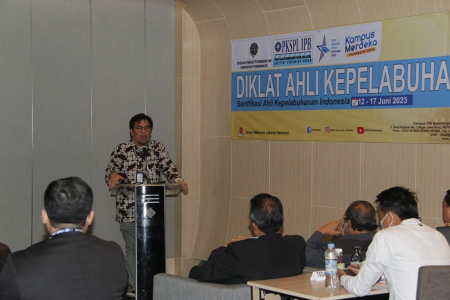PKSPL IPB University Together with the Directorate General of Transportation to Prepare Sea Transportation Human Resources to Face Future Maritime Challenges

IPB University's Center for Coastal and Marine Resources Studies (PKSPL IPB) together with the Directorate General (Ditjen) of Sea Transportation (Hubla), the Indonesian Ministry of Transportation (Kemenhub) are pushing for the acceleration of human resource development (HR) in the port sector. This was carried out through Port Expert Education and Training (Diklat) batch 43 which took place on 12-17 June 2023 in Jakarta.
"Ports and maritime logistics are part of IPB University's three mandates such as agriculture, maritime affairs and biosciences. One of the contributions of PKSPL IPB University in the maritime sector is consistently holding port expert training. Until now PKSPL IPB University has graduated more than 1,600 alumni who are competent and certified in operating ports, said Dr Andi Afandi, representing the Head of PKSPL IPB University.
He highlighted the importance of strengthening literacy and understanding in the maritime field. Through this Port Expert Training, PKSPL IPB University prepares transportation human resources to answer maritime challenges in the future. According to him, cross-stakeholder collaboration is needed to accelerate Indonesia's maritime development.
"Advancing sea transportation people is part of the duties and mandates that we must carry out at all times. We hope that after the training is held, the participants can share the information and knowledge they have gained so that there is a transformation of human resources in the port environment," said Dr Andi Afandi.
Furthermore, he stated that the current challenge is the implementation of port development and distribution of port governance at the central and regional levels. For this reason, cooperation and commitment that are aligned between the center and the regions are needed. "PKSPL IPB University is ready to fill the spaces for developing port human resources," he said.
Challenges at the international level, continued Dr Andi, are related to issues of climate change, energy transition, sustainable ports or green ports, because maritime activities in the maritime sector are one of the biggest sources of climate change contributors.
"Indonesia is also committed to going global by setting a Net Zero Emission target in 2060. Responding to global conditions, port activities must transform towards sustainable ports, one of which is by slowly making an environmentally friendly energy transition. This is presented in the material topics presented by the trainers in this activity," he explained.
Meanwhile, Anwaruddin, Head of the Port Management, Planning and Development Sub-Directorate, Directorate General of Transportation of the Ministry of Transportation, said that Indonesia as an archipelagic country has very strategic shipping lanes. As much as 90 percent of the world's freight transport is transported through the Indonesian archipelago sea lanes.
"However, Indonesia's logistics costs are still a problem that must be solved. This is a challenge in advancing the sea transportation sector in order to create an efficient and effective transportation ecosystem," he said.
He hopes that this activity can provide real benefits for the development of quality marine transportation human resources, especially in the port sector for the sake of the implementation of a reliable, competitive and able to adapt quickly to the times.
"My hope after the training is carried out is to be able to provide recommendations that answer problems that occur at the regional and central levels, national geopolitics, reduce gap regulation for the realization of national development in the maritime sector, especially sea transportation and logistics," he concluded. (IAAS/Res)



